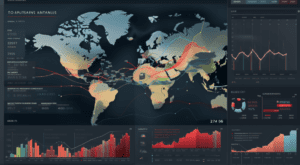If you’ve been wondering whether you can make money from online trading, you’ve come to the right place. In this article, you will learn about the potential opportunities and risks involved in online trading that can help you make an informed decision. Whether you’re a beginner or have some experience in trading, this article will provide valuable insights to help you on your trading journey.
Online trading can be a lucrative venture if done wisely. The second paragraph will discuss some key points to consider before starting online trading. It will touch upon topics such as the importance of research, choosing the right trading platform, managing risk, and having a disciplined approach. The aim is to provide a friendly and informative tone that encourages readers to explore the possibilities of making money from online trading.

Understanding Online Trading
What is online trading?
Online trading refers to the buying and selling of financial instruments, such as stocks, currencies, and options, through an online platform. It allows individuals to participate in the global financial markets from the comfort of their own homes or offices. Instead of calling a broker or physically visiting a trading floor, online trading enables traders to execute trades with just a few clicks of a button.
How does online trading work?
When you engage in online trading, you are essentially placing orders to buy or sell financial instruments through an online platform provided by a brokerage firm. The platform acts as an intermediary, connecting you to the relevant markets where your trades are executed.
To start online trading, you typically need to open an account with a brokerage firm. Once your account is set up and funded, you can access the trading platform and start placing trades. The platform provides you with real-time market data, charts, and tools to analyze the markets and make informed trading decisions.
Types of Online Trading
Stock trading
Stock trading involves buying and selling shares of companies listed on various stock exchanges. As a stock trader, you can profit from the price movements of individual stocks, taking advantage of both upward and downward trends. Stock trading is popular because it offers the potential for significant returns, especially if you have a good understanding of the companies you’re investing in.
Forex trading
Forex trading, also known as foreign exchange trading, involves buying and selling currencies in the foreign exchange market. The forex market is the largest and most liquid financial market in the world, with trillions of dollars traded daily. As a forex trader, you can profit from fluctuations in currency exchange rates. Forex trading offers high liquidity, low transaction costs, and the ability to trade 24 hours a day, five days a week.
Options trading
Options trading involves trading contracts that give you the right, but not the obligation, to buy or sell an underlying asset at a predetermined price within a specified period. Options are derivatives, which means their value is derived from an underlying asset, such as a stock or a commodity. Options trading can be complex, but it offers the potential for high returns and various strategies to profit from different market conditions.
Benefits of Online Trading
Convenience and flexibility
One of the key advantages of online trading is the convenience and flexibility it offers. With online trading, you can access the markets anytime and from anywhere as long as you have an internet connection. This means you can trade at your own convenience, whether it’s during your lunch break, in the evening, or even in the middle of the night. Online trading also allows you to manage your portfolio and monitor market movements in real-time, giving you greater control over your investments.
Access to global markets
Online trading provides individual investors with access to global financial markets that were once only accessible to institutional investors and professional traders. With online trading, you can trade stocks, currencies, and options from exchanges around the world, allowing you to diversify your portfolio and take advantage of opportunities in different markets. This global reach expands your potential for profit and increases the likelihood of finding investments that align with your trading strategies.
Lower transaction costs
Compared to traditional methods of trading, such as calling a broker or visiting a trading floor, online trading typically comes with lower transaction costs. The brokerage fees associated with online trading are often lower than the commissions charged by traditional brokers. This is especially true for online brokers that operate on a discount or no-commission basis. Lower transaction costs mean you can keep more of your profits and potentially achieve higher returns on your investments.
Skills Required for Successful Online Trading
Market analysis
To be successful in online trading, you need to have a good understanding of market analysis. This involves analyzing financial data, such as price charts and indicators, to identify trends and patterns that can inform your trading decisions. Market analysis requires both technical skills, such as knowledge of chart patterns and technical indicators, and fundamental skills, such as understanding of economic factors that can impact the markets.
Risk management
Effective risk management is crucial in online trading. It involves identifying and assessing potential risks associated with your trades and implementing strategies to mitigate those risks. This includes setting stop-loss orders to limit your losses, diversifying your portfolio to spread risk, and avoiding overexposure to any single trade or asset. Successful traders understand that losses are part of the trading process and manage their risks accordingly.
Discipline and patience
Online trading requires discipline and patience. It’s important to stick to your trading plan and not be swayed by emotions or short-term market fluctuations. Successful traders have a well-defined strategy and follow it consistently, even when faced with losses. They understand that trading is a long-term game and focus on making consistent, informed decisions rather than chasing quick profits.
Common Mistakes to Avoid in Online Trading
Overtrading
Overtrading is a common mistake that many traders make, especially when starting out. It involves executing too many trades or taking on excessive risk without a clear strategy. Overtrading can lead to poor decision-making, increased transaction costs, and emotional stress. It’s important to trade based on a solid plan and only take trades that meet your predefined criteria.
Not having a trading plan
Not having a trading plan is another common mistake that can lead to inconsistent and unprofitable trading. A trading plan outlines your goals, risk tolerance, entry and exit criteria, and other important aspects of your trading strategy. Without a plan, you are more likely to make impulsive and irrational decisions based on short-term market movements, which can result in losses.
Ignoring risk management
Ignoring risk management is a recipe for disaster in online trading. It’s important to always consider the potential risks associated with your trades and take measures to protect your capital. This includes setting appropriate stop-loss orders, diversifying your portfolio, and adhering to position sizing rules. Ignoring risk management can expose you to significant losses and jeopardize your long-term profitability.
Choosing an Online Trading Platform
Key features to consider
When choosing an online trading platform, there are several key features to consider. These include the platform’s user interface and usability, reliability and stability, availability of real-time market data and research tools, and compatibility with different devices. A good trading platform should provide you with a seamless and intuitive trading experience, allowing you to execute trades quickly and efficiently.
Fees and commissions
Fees and commissions can vary significantly between online trading platforms. It’s important to consider the costs associated with trading, including brokerage fees, account maintenance fees, and any additional charges for specific services. While low fees are desirable, it’s also important to evaluate the quality of services provided by the platform, as a reliable and feature-rich platform can often justify higher fees.
Customer support
Customer support is an important factor to consider, especially if you’re new to online trading. A good trading platform should offer responsive and knowledgeable customer support to assist you with any technical issues or questions you may have. Look for platforms that offer multiple channels of support, such as live chat, email, and phone, and ensure that support is available during the hours you are most likely to trade.
Developing an Online Trading Strategy
Setting financial goals
Before you start trading, it’s important to define your financial goals. Are you looking for short-term profits or long-term wealth accumulation? Are you trading for supplemental income or as a full-time job? Setting clear and realistic financial goals will help guide your trading decisions and keep you focused on your long-term objectives.
Determining risk tolerance
Understanding your risk tolerance is essential in developing an online trading strategy. Risk tolerance refers to your ability and willingness to take on financial risk. It’s important to assess your financial situation, investment experience, and emotional resilience to determine how much risk you are comfortable with. Your risk tolerance will dictate the types of instruments you trade, the position sizes you take, and the level of leverage you use.
Selecting trading indicators
Trading indicators are tools used to analyze market data and identify potential trading opportunities. There are numerous indicators available, including moving averages, oscillators, and trend lines. It’s important to select indicators that align with your trading style and provide you with reliable signals. Experiment with different indicators and find the ones that work best for you.
Creating a Trading Plan
Defining entry and exit points
A trading plan should clearly define your entry and exit points for each trade. These levels are determined based on your analysis of the markets and should align with your trading strategy. Entry points are the price levels at which you enter a trade, while exit points are the price levels at which you exit a trade to take profits or cut losses. Clearly defining these levels before entering a trade helps remove emotions from your decision-making process.
Allocating capital
Proper capital allocation is important in managing your trading portfolio. It involves determining how much capital you will allocate to each trade, taking into consideration your risk tolerance and the potential for profit. It’s generally recommended to risk no more than 1-2% of your trading capital on each trade to minimize the impact of losses and protect your overall portfolio.
Monitoring and reviewing trades
Once you have executed a trade, it’s important to continuously monitor and review its progress. This involves regularly assessing the market conditions, reassessing your entry and exit points, and adjusting your strategy if necessary. Keeping a trading journal can be helpful in tracking your trades and evaluating your performance over time. By reviewing your trades, you can identify patterns and areas for improvement, which can contribute to your long-term success as a trader.

Managing Emotions in Online Trading
Dealing with fear and greed
Fear and greed are common emotions that can significantly impact your trading decisions. Fear can prevent you from taking necessary risks, while greed can lead to impulsive and irrational behavior. To manage these emotions, it’s important to have a solid trading plan and stick to it. By following your plan and taking a disciplined approach, you can minimize the influence of fear and greed on your trading decisions.
Maintaining discipline during losses
Losses are an inevitable part of trading. It’s important to maintain discipline and emotional control during losing trades. Avoid seeking revenge by taking impulsive trades to recoup your losses, as this can exacerbate your losses further. Instead, review your trades and analyze the reasons behind the losses. Learn from your mistakes and make adjustments to your strategy if necessary.
Handling successful trades
Handling successful trades can be just as challenging as managing losses. It’s important to avoid becoming overconfident and making rash decisions based on short-term successes. Stick to your trading strategy and resist the urge to deviate from your plan. Consistency and discipline are key to long-term success in online trading.
Conclusion
In conclusion, online trading offers the potential for profit, but success requires knowledge, skills, and emotional control. By understanding the different types of online trading, the benefits it offers, and the skills required for success, you can increase your chances of making money in the online trading world. Remember to choose a reliable online trading platform, develop a solid trading strategy, and manage your emotions effectively. With the right approach, online trading can be a rewarding and profitable endeavor.




